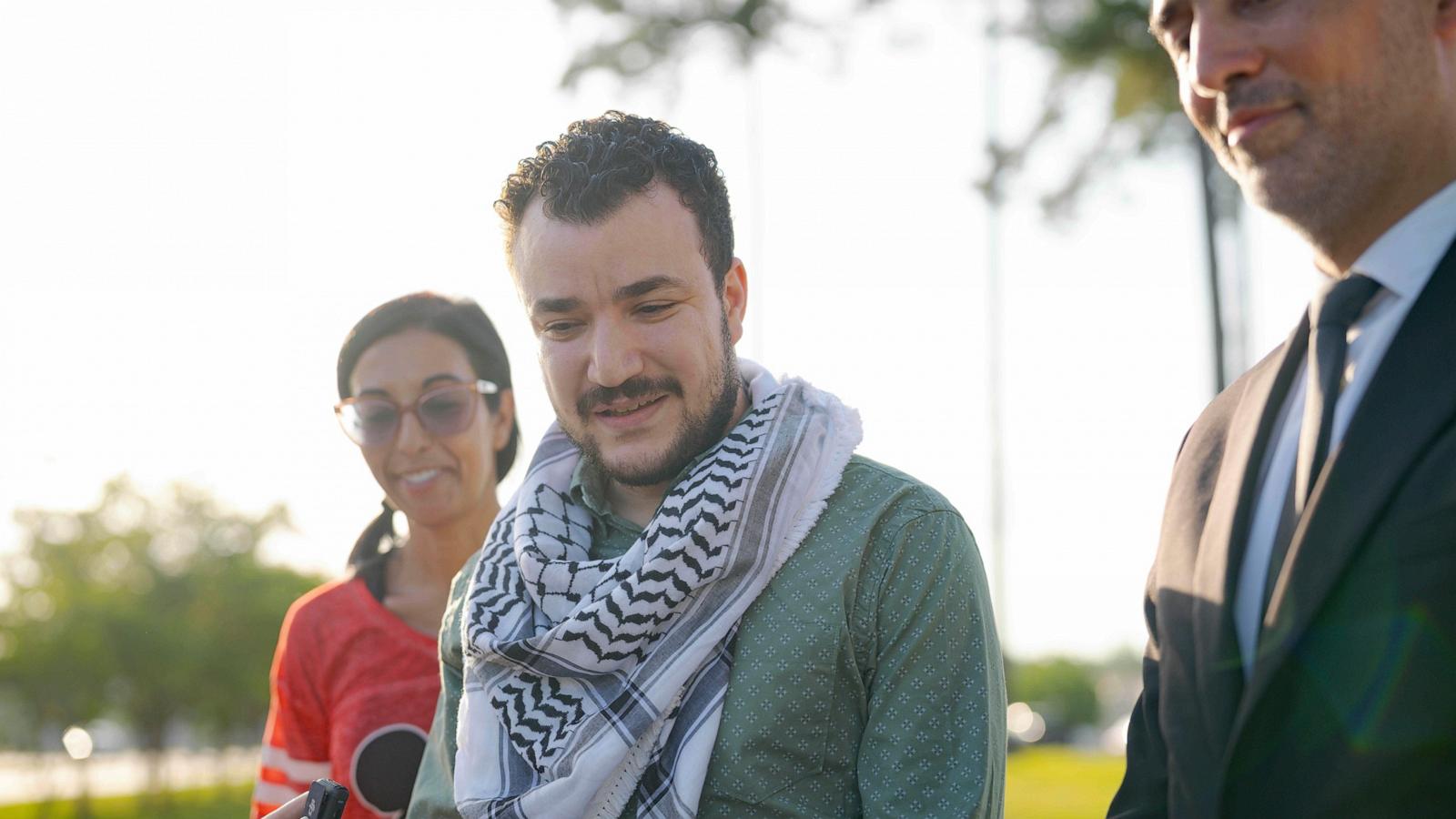Columbia University pro-Palestinian activist Mahmoud Khalil was released from an Immigration and Customs Enforcement facility in Jena, Louisiana, on Friday evening after more than three months in custody.
Khalil told reporters that the first thing he’ll do when he arrives home is hug his wife and his son, who was born while he was in custody.
“The hundreds of men who are left behind me shouldn’t be there in the first place,” Khalil told reporters, referring to others being detained. “The Trump administration are doing their best to dehumanize everyone here — whether you are a U.S. citizen, an immigrant or just a person on this land, doesn’t mean that you are less of a human.”
Khalil said he would have more to say at a press conference in New York on Saturday.
Earlier Friday, U.S. District Judge Michael Farbiarz had issued an order granting Khalil’s release on bail, a decision that was sharply criticized by the Trump administration.
Khalil, a green card holder who is married to an American citizen, has been held in a Louisiana detention facility since he was arrested by ICE agents in New York City in March.
The ruling came at the same time an immigration judge in Jena, Louisiana, denied Khalil’s request for asylum and ordered him to remain detained — but Judge Farbiarz’s order supersedes that.
“An immigration judge, not a district judge, has the authority to decide if Mr. Khalil should be released or detained,” the Department of Homeland Security said in a statement posted online. “On the same day an immigration judge denied Khalil bond and ordered him removed, one rogue district judge ordered him released. This is yet another example of how out of control members of the judicial branch are undermining national security. Their conduct not only denies the result of the 2024 election, it also does great harm to our constitutional system by undermining public confidence in the courts.”
The judge indicated in the order that the conditions of Khalil’s release shall not include electronic monitoring or a requirement that a bond be immediately posted.
“The bail conditions shall include other requirements that the United States Magistrate Judge deems appropriate, including as to those states to which and through which the Petitioner may travel, and when the Petitioner must surrender his passport or passports,” Farbiarz wrote.
Conditions for Khalil’s release, as set by U.S. Magistrate Judge Michael Hammer, include that he surrender his passport to authorities at the Jena detention facility where he was held, according to the court order. He must also restrict domestic travel to where he and his in-laws live, as well as where he may have attorney meetings, court appearances and legislative meetings. The government will return his green card and there will be no electronic monitoring, according to the court order.
During the telephonic hearing before Judge Hammer on Friday regarding the bail conditions, the DOJ attorney argued that Khalil’s green card should not be returned to him because the immigration judge in Jena had just issued an order of removal. Khalil’s attorneys argued that he should keep his green card, allowing for an appeal of the immigration judge’s ruling. Hammer agreed with Khalil’s lawyers and ordered that the green card be returned.

Farbiarz issued his order after denying a motion by the government to stay the ruling for seven days.
During the hearing, Farbiarz said the government made no attempt to prove that Khalil’s release would irreparably harm them in some way, and that Khalil represented a flight risk.
“What all that evidence adds up to is a lack of violence, a lack of property destruction, a lack of anything that might be characterized as incitement to violence,” the judge said of Khalil, who helped lead Columbia’s encampment protests against the war in Gaza over the spring.
An attorney for Khalil, Alina Das, reasserted Khalil’s belief that he is being punished for speech that should be protected by the First Amendment.
“The government’s latest actions confirm what we’ve alleged in this petition all along, that retaliatory detention is the government’s goal, that the purpose of every step that the government has taken in this case has been to ensure that Mr. Khalil remains locked away until he is deported as retaliation and punishment for his speech and viewpoint,” she said.
Last week, Judge Farbiarz issued a preliminary injunction barring the Trump administration from continuing to detain Khalil based on Secretary of State Marco Rubio’s determination that his continued presence in the country would pose a risk to foreign policy — but the judge subsequently sided with the government in ruling that Khalil could continue to be detained on the grounds that he misrepresented information on his green card application, which Khalil denies.
ABC News: Top Stories
Read the full article .


